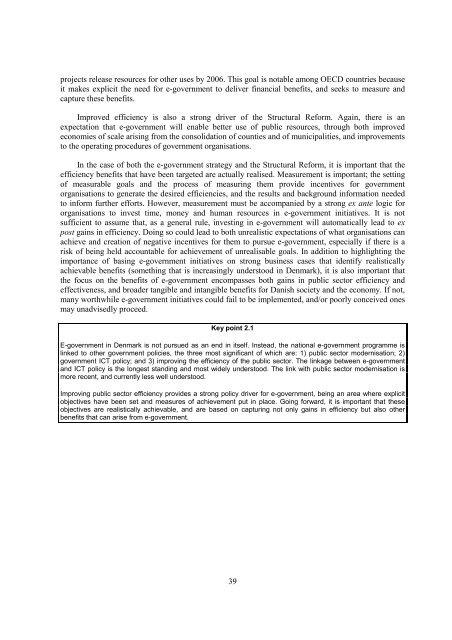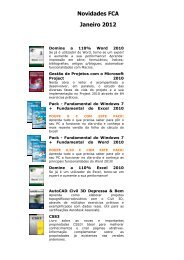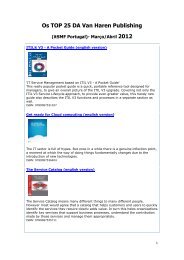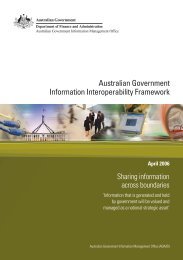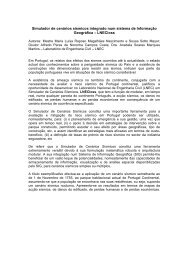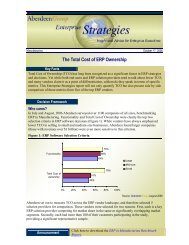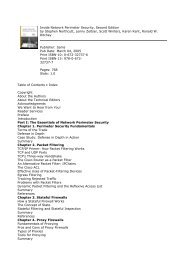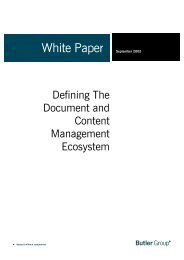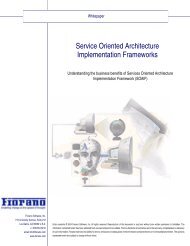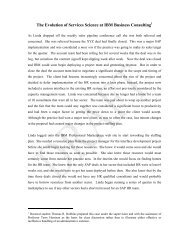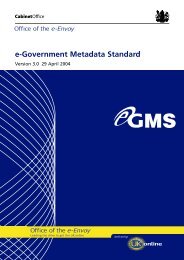OECD Peer Review of E-Government in Denmark - ePractice.eu
OECD Peer Review of E-Government in Denmark - ePractice.eu
OECD Peer Review of E-Government in Denmark - ePractice.eu
You also want an ePaper? Increase the reach of your titles
YUMPU automatically turns print PDFs into web optimized ePapers that Google loves.
projects release resources for other uses by 2006. This goal is notable among <strong>OECD</strong> countries because<br />
it makes explicit the need for e-government to deliver f<strong>in</strong>ancial benefits, and seeks to measure and<br />
capture these benefits.<br />
Improved efficiency is also a strong driver <strong>of</strong> the Structural Reform. Aga<strong>in</strong>, there is an<br />
expectation that e-government will enable better use <strong>of</strong> public resources, through both improved<br />
economies <strong>of</strong> scale aris<strong>in</strong>g from the consolidation <strong>of</strong> counties and <strong>of</strong> municipalities, and improvements<br />
to the operat<strong>in</strong>g procedures <strong>of</strong> government organisations.<br />
In the case <strong>of</strong> both the e-government strategy and the Structural Reform, it is important that the<br />
efficiency benefits that have been targeted are actually realised. Measurement is important; the sett<strong>in</strong>g<br />
<strong>of</strong> measurable goals and the process <strong>of</strong> measur<strong>in</strong>g them provide <strong>in</strong>centives for government<br />
organisations to generate the desired efficiencies, and the results and background <strong>in</strong>formation needed<br />
to <strong>in</strong>form further efforts. However, measurement must be accompanied by a strong ex ante logic for<br />
organisations to <strong>in</strong>vest time, money and human resources <strong>in</strong> e-government <strong>in</strong>itiatives. It is not<br />
sufficient to assume that, as a general rule, <strong>in</strong>vest<strong>in</strong>g <strong>in</strong> e-government will automatically lead to ex<br />
post ga<strong>in</strong>s <strong>in</strong> efficiency. Do<strong>in</strong>g so could lead to both unrealistic expectations <strong>of</strong> what organisations can<br />
achieve and creation <strong>of</strong> negative <strong>in</strong>centives for them to pursue e-government, especially if there is a<br />
risk <strong>of</strong> be<strong>in</strong>g held accountable for achievement <strong>of</strong> unrealisable goals. In addition to highlight<strong>in</strong>g the<br />
importance <strong>of</strong> bas<strong>in</strong>g e-government <strong>in</strong>itiatives on strong bus<strong>in</strong>ess cases that identify realistically<br />
achievable benefits (someth<strong>in</strong>g that is <strong>in</strong>creas<strong>in</strong>gly understood <strong>in</strong> <strong>Denmark</strong>), it is also important that<br />
the focus on the benefits <strong>of</strong> e-government encompasses both ga<strong>in</strong>s <strong>in</strong> public sector efficiency and<br />
effectiveness, and broader tangible and <strong>in</strong>tangible benefits for Danish society and the economy. If not,<br />
many worthwhile e-government <strong>in</strong>itiatives could fail to be implemented, and/or poorly conceived ones<br />
may unadvisedly proceed.<br />
Key po<strong>in</strong>t 2.1<br />
E-government <strong>in</strong> <strong>Denmark</strong> is not pursued as an end <strong>in</strong> itself. Instead, the national e-government programme is<br />
l<strong>in</strong>ked to other government policies, the three most significant <strong>of</strong> which are: 1) public sector modernisation; 2)<br />
government ICT policy; and 3) improv<strong>in</strong>g the efficiency <strong>of</strong> the public sector. The l<strong>in</strong>kage between e-government<br />
and ICT policy is the longest stand<strong>in</strong>g and most widely understood. The l<strong>in</strong>k with public sector modernisation is<br />
more recent, and currently less well understood.<br />
Improv<strong>in</strong>g public sector efficiency provides a strong policy driver for e-government, be<strong>in</strong>g an area where explicit<br />
objectives have been set and measures <strong>of</strong> achievement put <strong>in</strong> place. Go<strong>in</strong>g forward, it is important that these<br />
objectives are realistically achievable, and are based on captur<strong>in</strong>g not only ga<strong>in</strong>s <strong>in</strong> efficiency but also other<br />
benefits that can arise from e-government.<br />
39


